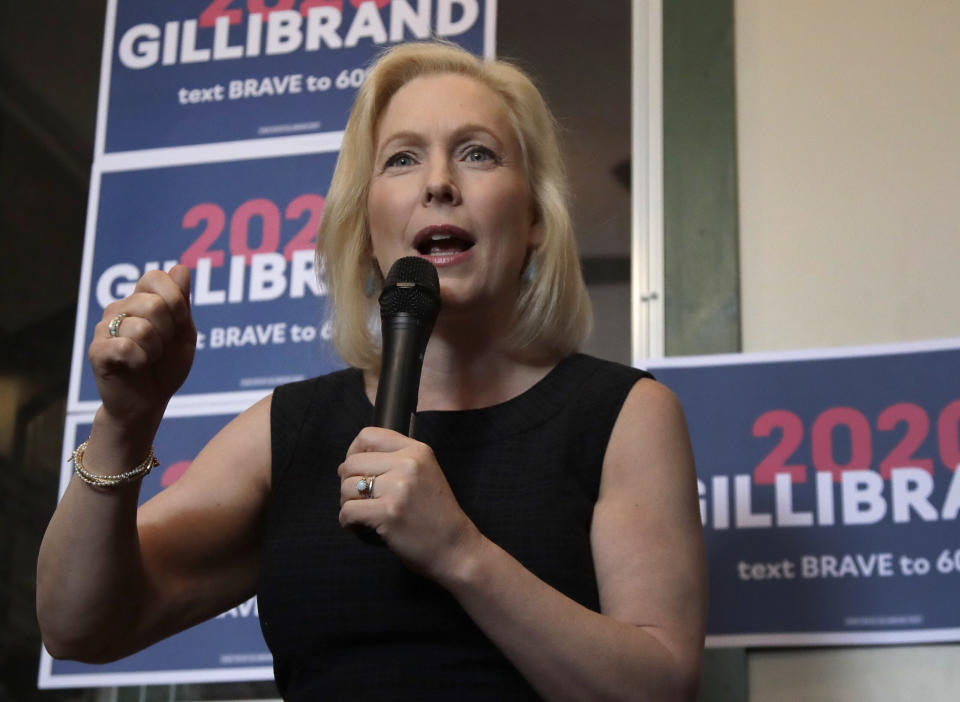Kirsten Gillibrand Drops Out Of Democratic Presidential Race
Sen. Kirsten Gillibrand (D-N.Y.) is no longer running for the 2020 Democratic presidential nomination, she announced Wednesday.
Gillibrand dropped out after failing to qualify for the September debate.
“It’s important to know when it’s not your time and to know how you can best serve your community and country,” she said in her announcement video. “I believe I can best serve by helping to unite us to beat Donald Trump in 2020.”
“We have to defeat President Trump, flip the Senate and elect women up and down the ballot,” she added.
Today, I am ending my campaign for president.
I am so proud of this team and all we've accomplished. But I think it’s important to know how you can best serve.
To our supporters: Thank you, from the bottom of my heart. Now, let's go beat Donald Trump and win back the Senate. pic.twitter.com/xM5NGfgFGT— Kirsten Gillibrand (@SenGillibrand) August 28, 2019
Gillibrand framed her campaign as a fight for a return to “America’s values,” publicizing her consistent anti-Trump record and her past political advocacy and legislation, especially for women and families. She campaigned on protecting abortion rights, ending gun violence and curbing America’s warfare abroad.
At a July campaign event, Gillibrand drew significant attention for her powerful remarks on racism and white privilege: “Institutional racism is real ― it doesn’t take away your pain or suffering. It’s just a different issue,” she told an audience member who had asked about “so-called white privilege.”
But Gillibrand struggled to gain traction. It took until June for her to announce she had enough donors to meet the 65,000 donor threshold to ensure a spot on the Democratic debate stage. In early June, she hinted she’d be willing to support another Democratic candidate if they had a better chance of defeating President Donald Trump.
“I think it’s important that one of us survives, because it’s really important that our nominee is absolutely impenetrable,” she said at an event in early June, according to HuffPost’s Emma Gray. “I want to make sure that we have the strongest most capable nominee possible.”
Gillibrand first hinted at a presidential bid in November 2018 on “The Late Show with Stephen Colbert.” She returned to the show that January with a more concrete declaration: she had formed an exploratory committee for president. In March, Gillibrand announced she was running for president outside Manhattan’s Trump International Hotel after releasing her first campaign ad.
Gillibrand, who attended Dartmouth College and UCLA School of Law, previously served as a congresswoman for New York’s 20th Congressional District from 2007 to 2009. She was a Blue Dog Democrat in the House and initially held more conservative views, notably on immigration and gun reform.
But she moved farther to the left during her time in the Senate, and at the start of her campaign revealed her regret over past positions on immigration. “I was callous to the suffering of families that want to be together,” she told MSNBC’s Rachel Maddow in January.
Gillibrand has established herself as a vocal critic of Trump, focusing in particular on his record on women’s rights. If elected president, Gillibrand declared in May, she would only nominate judges “who will commit to upholding Roe v. Wade.”
“Women deserve a president who understands the real stakes of this fight for the judiciary,” she wrote in an essay on Medium in May.

Gillibrand voted “no” on the most nominees to Trump’s cabinet and administration of any senator.
As a senator, Gillibrand focused her efforts in particular on legislation benefiting women and families, advocacy she carried through to her platform in her presidential campaign. She introduced the Family and Medical Insurance Leave Act, establishing a 12-week partially paid leave for employees who are new parents or need to care for family members with severe health issues, in 2013. In 2019, with Democrats in control of the House, she reintroduced the bill.
Gillibrand also fought for legislative reform addressing sexual assault — in particular, in the military and on college campuses. Her Military Justice Improvement Act, which she introduced in 2013 but has not made it past the Senate, sought to forge policies for determining trial proceedings to address in particular the prosecution of sexual assault. Gillibrand also co-sponsored a bill aiming to reform university response to sexual assault on campus. The bill didn’t make it out of the House or Senate.
Gillibrand drew attention in 2017 for being the first to call for former Minnesota Sen. Al Franken’s (D) resignation after he faced multiple allegations of sexual misconduct — a position she continued to defend and recently said she had “no regrets” about. Earlier this month, asked about a hypothetical political comeback for Franken, Gillibrand said: “There’s always a path for redemption for anybody.”
In a December 2017 Facebook post, Gillibrand had announced that despite her friendship with the former senator, she had to look at the bigger picture.
“We must not lose sight that this watershed moment is bigger than any one industry, any one party, or any one person,” she wrote at the time.
“I had a choice to make whether to stay silent or not, whether to say, ‘That’s not OK with me,’ and I decided to say that,” she said at an MSNBC town hall in March, citing his many allegations.
This article has been updated with details on Gillibrand’s recent comments on white privilege and her remarks about Al Franken.
Related Content
Kirsten Gillibrand Shuts Down Fox News Host Who Asked About Men's 'Seat At The Table'
Kirsten Gillibrand Announces Plan For National Marijuana Legalization
Kirsten Gillibrand Compares Anti-Abortion Views To Racism
Love HuffPost? Become a founding member of HuffPost Plus today.
This article originally appeared on HuffPost.
